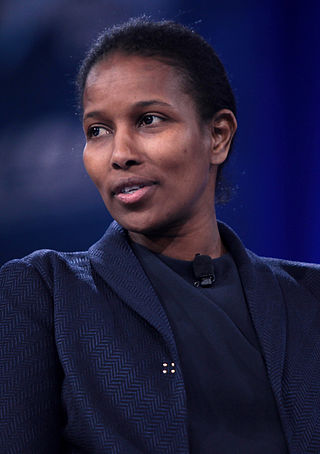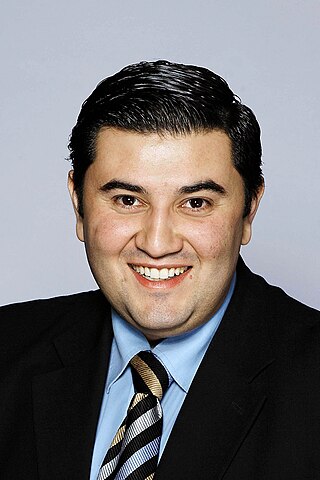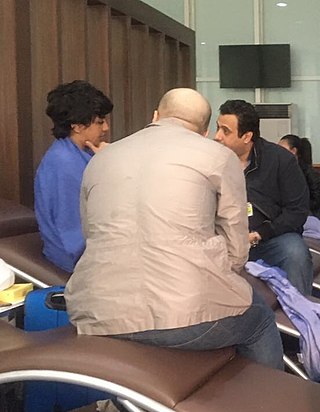Related Research Articles
An asylum seeker is a person who leaves their country of residence, enters another country and applies for asylum in that other country. An asylum seeker is an immigrant who has been forcibly displaced and might have fled their home country because of war or other factors harming them or their family. If their case is accepted, they become considered a refugee. The terms asylum seeker, refugee and illegal immigrant are often confused.

Abderraouf bin Habib bin Yousef Jdey is a Canadian citizen, who was found swearing to die as a shaheed (martyr) on a series of videotapes found in the rubble of Mohammed Atef's house in Afghanistan in 2002.
Human Rights First is a nonpartisan, 501(c)(3), international human rights organization based in New York City and Washington, D.C. In 2004, Human Rights First started its "End Torture Now" campaign. The organization also runs the Fighting Discrimination program which focuses on hate crime.

Ayaan Hirsi Ali is a Somali-born Dutch-American activist and former politician. She is a critic of Islam and advocate for the rights and self-determination of Muslim women, opposing forced marriage, honor killing, child marriage, and female genital mutilation. She has founded an organisation for the defense of women's rights, the AHA Foundation. Ayaan Hirsi Ali works for the Hoover Institution at Stanford University, the American Enterprise Institute, and was a senior fellow at the Future of Democracy Project at Harvard Kennedy School.

The Pacific Solution is the name given to the Government of Australia's policy of transporting asylum seekers to detention centres on island nations in the Pacific Ocean, rather than allowing them to land on the Australian mainland. Initially implemented from 2001 to 2007, it had bipartisan support from the Coalition and Labor opposition at the time. The Pacific Solution consisted of three central strategies:

The right of asylum is an ancient juridical concept, under which people persecuted by their own rulers might be protected by another sovereign authority, like a second country or another entity which in medieval times could offer sanctuary. This right was recognized by the Ancient Egyptians, the Greeks, and the Hebrews, from whom it was adopted into Western tradition. René Descartes fled to the Netherlands, Voltaire to England, and Thomas Hobbes to France, because each state offered protection to persecuted foreigners.
Non-refoulement is a fundamental principle of international law that forbids a country receiving asylum seekers from returning them to a country in which they would be in likely danger of persecution based on "race, religion, nationality, membership of a particular social group or political opinion". Unlike political asylum, which applies to those who can prove a well-grounded fear of persecution based on certain category of persons, non-refoulement refers to the generic repatriation of people, including refugees into war zones and other disaster locales. It is a principle of customary international law, as it applies even to states that are not parties to the 1951 Convention Relating to the Status of Refugees or its 1967 Protocol. It is also a principle of the trucial law of nations.

Maria Cornelia Frederika "Rita" Verdonk is a Dutch politician of the People's Party for Freedom and Democracy (VVD) and later founder of the Proud of the Netherlands (Trots) party and businesswoman.

ʿAbdul Qādir Gīlānī, known by admirers as Muḥyī l-Dīn Abū Muḥammad b. Abū Sāliḥ ʿAbd al-Qādir al-Jīlānī al-Baḡdādī al-Ḥasanī al-Ḥusaynī, was a Sunni Muslim preacher, ascetic, mystic, jurist, and theologian belonging to the Hanbali, and the eponymous founder of the Qadiriyya tariqa of Sufism. The Qadiriyya tariqa is named after him.

The United States recognizes the right of asylum for refugees as specified by international and federal law. A specified number of legally defined refugees who are granted refugee status outside the United States are annually admitted under 8 U.S.C. § 1157 for firm resettlement. Other people enter the United States as aliens either lawfully or unlawfully and apply for asylum under section 1158.
Immigration Control Platform (ICP) is a political group which seeks to restrict immigration to Ireland. The organisation's website describes it as an "Irish NGO" funded by subscriptions and donations. It was not registered in Ireland as a political party, but between 2002 and 2011 it ran non-party candidates in elections, with their election material displaying the Immigration Control Platform branding.
The Australian government has a policy and practice of detaining in immigration detention facilities non-citizens not holding a valid visa, suspected of visa violations, illegal entry or unauthorised arrival, and those subject to deportation and removal in immigration detention until a decision is made by the immigration authorities to grant a visa and release them into the community, or to repatriate them to their country of origin/passport. Persons in immigration detention may at any time opt to voluntarily leave Australia for their country of origin, or they may be deported or given a bridging or temporary visa.

Mazyar Keshvari is an Iranian-born Norwegian former politician for the Progress Party and a convicted felon who is serving two prison sentences for fraud and violent threats. He was elected as a substitute member of the Norwegian parliament for the city of Oslo in 2013, representing the right-wing and anti-immigration Progress Party, and attended parliamentary sessions from 2013 to 2018 as the substitute of the mandate holder Siv Jensen who has been on leave from parliament during her government service. As a politician he was known for taking a hard stance on immigration, calling for a complete ban on further immigration to Norway, a stop to the practice of accepting asylum seekers in Norway, and the deportation of immigrants convicted of crimes. In 2019 he was convicted of aggravated fraud for defrauding the Norwegian parliament and in 2020 he was sentenced to 11 months imprisonment. He left the Norwegian parliament following his indictment in 2018 and also left the Progress Party in October 2019. In 2019 he was also arrested and charged with making violent threats, and he was convicted and sentenced to an additional four months in prison in 2020.
There are a small number of Iranians in Pakistan, the vast majority of whom live in Karachi and Lahore. Most are students, while others are political asylum seekers, of which the latter are mostly Iranian Baloch.
Asylum in Australia has been granted to many refugees since 1945, when half a million Europeans displaced by World War II were given asylum. Since then, there have been periodic waves of asylum seekers from South East Asia and the Middle East, with government policy and public opinion changing over the years.
LGBT migration is the movement of lesbian, gay, bisexual, transgender, and queer (LGBT) people around the world and domestically, often to escape discrimination or ill treatment due to their sexuality. Globally, many LGBT people attempt to leave discriminatory regions in search of more tolerant ones.

Dina Ali Lasloom is a Saudi woman who attempted to seek asylum in Australia to escape Saudi guardianship laws, but was forcibly repatriated to Saudi Arabia from the Philippines. She was stopped in transit at Ninoy Aquino International Airport in Manila on 10 April 2017 and sent back to Saudi Arabia on 11 April 2017.

Hazara Australians or Australian Hazaras are Australians who have Hazara ancestry. The Hazaras are an ethnic group native to, and primarily residing in, the mountainous region of Hazarajat in central Afghanistan. Many Hazara Australians have also migrated from Pakistan. The Hazara Council of Australia is an organization formed by the Hazara community of Australia. Hazaras constitute one of the largest ethnic groups of asylum seekers in Australia
Susanna Maria Feldmann was a 14-year-old German girl who was raped and killed on the night of 22 May 2018 in Wiesbaden. Ali Bashar Ahmad Zebari, a 21-year-old asylum seeker from Iraqi Kurdistan, confessed to the murder and was found guilty in July 2019 at a trial in Landgericht Wiesbaden.
As Indonesia did not sign the convention on the status of refugees and lacks any domestic legislations providing refugees rights, refugees in Indonesia do not have the right to employment, permanent residency or citizenship.
References
- ↑ "Letters to Ali". The Age. 23 September 2004. Retrieved 17 March 2023.
- ↑ Law, C. (2004). Letters to Ali [DVD]. Obtained via Monash University Library